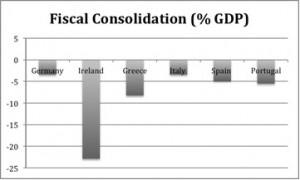Austerity to reduce spending and decrease the need for imports, and liberalization reforms to reduce real wages and promote internal devaluation have been going on for a while in the European periphery to promote rebalancing, that is, to reduce the current account deficits and allow for continuous servicing of the debt.
How much fiscal adjustment and wage reduction have already been pushed by the Troika (ECB, EU, IMF)? Quite a bit in fact. Figure 1 below shows the fiscal adjustment (all data from the European Commission’s Statistical Annex of the European Economy, Spring 2012). [Note that the crisis was not fiscal]

In Greece the fiscal deficit was reduced from 15.6% to an estimated 7.3% of GDP this year, implying an adjustment of 8.3% of GDP, which is only smaller then the Irish adjustment (at an incredible 22.9%). In the Iberian Peninsula adjustment was around 5%, while in Italy it remains at German levels, that is, 3.4% of GDP.
Figure 2 shows the other important element of the conservative strategy for adjustment, the cumulative real wage reduction in the periphery. Note that the logic is that lower real wages would make the economies of the periphery more competitive vis-à-vis Germany, but for the most part, what this policy does is to complement the fiscal adjustment by reducing the income of the working class, and reducing consumption. In other words, the adjustment is basically achieved by lower income leading to lower consumption of imported goods.

Here Greece leads with a cumulative reduction in real wages of more than 21% since 2010. Note that while real wages have fallen in all peripheral countries they have increased marginally in Germany (1.5%, not per year, but cumulatively since 2010).
Did all the adjustment eliminate the current account imbalances? There has been significant rebalancing, no doubt, as can be seen in figure 3, which shows the change in the current account (CA) deficits as a share of GDP.

In Greece, again the champion of adjustment, the current account deficit was reduced from almost 18% points of GDP to slightly less than 8%, in a staggering reduction of some 10.1% points of GDP. That is, in spite of the Herculean effort, Greece still has a sizeable deficit in the current account. The same is true of almost all peripheral countries, but Italy, with only Ireland being able to obtain an estimated surplus this year. Italy and Spain (with a reduction of 8%) will still have a deficit of around 2% of GDP while Portugal will still have a larger one of more or less 3.5% per cent. Germany decreased its surplus by almost 3%, but it will maintain an estimated surplus of 4.7% of GDP in 2012.
In other words, there is still a significant amount of rebalancing to be done. But the question is: what price, besides the incredible reduction in real wages seen above, did the peripheral countries had to pay in order to get some rebalancing, and be able to continue within the euro? The best variable to understand the costs is certainly the change in the unemployment rate, shown in figure 4 below.

Here Spain leads the way with an increase in the rate of unemployment of 16.1 percentage points, going from 8.3% in 2007 to an estimated 24.4% this year. In Greece the increase of 12 percentage points led to an unemployment rate of 19.7% estimated for 2012. In Ireland and Portugal the increase was of the order of 10 percentage points, while in Italy it was comparatively small at around 3.5 percentage points. In Germany the rate of unemployment was reduced by more or less 2 percentage points.
In conclusion, massive reduction in real wages and increases in unemployment, with all the negative social consequences that follow, and with what result? Not to obtain enough rebalancing, let alone eliminate the possibility of a crisis associated with a default. Isn’t austerity great?!
Angry, shocked, overwhelmed? Take action: Support independent media.
We’ve borne witness to a chaotic first few months in Trump’s presidency.
Over the last months, each executive order has delivered shock and bewilderment — a core part of a strategy to make the right-wing turn feel inevitable and overwhelming. But, as organizer Sandra Avalos implored us to remember in Truthout last November, “Together, we are more powerful than Trump.”
Indeed, the Trump administration is pushing through executive orders, but — as we’ve reported at Truthout — many are in legal limbo and face court challenges from unions and civil rights groups. Efforts to quash anti-racist teaching and DEI programs are stalled by education faculty, staff, and students refusing to comply. And communities across the country are coming together to raise the alarm on ICE raids, inform neighbors of their civil rights, and protect each other in moving shows of solidarity.
It will be a long fight ahead. And as nonprofit movement media, Truthout plans to be there documenting and uplifting resistance.
As we undertake this life-sustaining work, we appeal for your support. Please, if you find value in what we do, join our community of sustainers by making a monthly or one-time gift.
